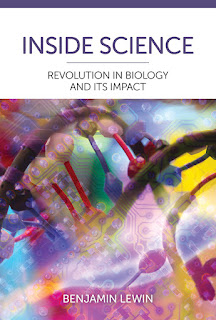Benjamin Lewin is the author of the new book Inside Science: Revolution in Biology and Its Impact. His other books include the Genes textbook. He founded the Cell journal and was its editor for many years. He lives in New York City and in London.
Q: What inspired you to write Inside Science?
A: There were two driving forces, one from inside science and one from outside. Scientists have a certain view of how science works, and I want to disentangle myth from reality and explain that science is a messy process, with its flaws, to show how it really works, so that it’s possible to understand how and why the system produces results that are reliable.
Also, the atmosphere within science has changed in the past couple of decades, as large scale research teams have replaced single investigators or small groups: I want to analyze what that means for the scientific endeavor.
From the outside, I have felt for a long time that science is often misunderstood by people who are not scientists. There’s a very stylized, you might almost say a caricature, of science by nonscientists, who view it as a sort of black box issuing results¾but if you don’t understand the system by which those results are obtained, you can’t understand their limitations.
I was also conscious that science is under attack from intellectuals in other areas and want to refute those attacks.
Q: What do you see as the role politics plays in determining which areas of science receive funding? And what do you see looking ahead in that regard?
A: Once funding moved away from private means to government sponsorship, which happened in a much expanded way after the second world war, it became inevitable that politics would become a factor.
Actually for a long time, several decades in fact, the mantra was that government should support allow basic science to investigate whatever scientists found interesting. This was based on the belief that you simply never know where an observation will lead.
Slowly the funding mechanism lost sight of that conclusion and there has been more of a demand for “relevance.” I want to explain why that is so counterproductive. The ramifications go beyond decisions on what to fund, but make for a sort of self-censorship in which scientists don’t apply for grants to investigate things they think are interesting but might not be judged to have sufficient relevance.
I am afraid that unless we improve public understanding of science, this is going to get worse.
Q: What impact do you see AI having on the way science is currently practiced?
A: It’s making it more difficult to judge the validity of research. Of course, it’s always been true that if you’re not closely involved in some particular field of study, it’s difficult to assess the validity of data. but in principle you could work your way back to first principles and try to understand the logic.
But when an AI program is used, even its creators may not fully understand how it works – so how can we validate its results? Already there are cases in which a conclusion has been accepted because it was produced by an algorithm, whereas if a person had explained all the steps in interpreting the data, some of them might have been rejected.
Q: What do you hope readers take away from the book?
A: That science is a unique system because it is genuinely self-correcting, so that results that aren’t correct will be found out and rejected. This is why it is so powerful. We should support basic research because you really never know when it will lead to some fundamental advance that improves medicine or develops important new technology.
Q: What are you working on now?
A: I am writing another book, Ascent of Science, which takes the position that science has become the dominant force in intellectual activity. This is equally true whether you are devoted to science or fervently oppose it.
I want to explain how this situation arose by tracing the development of science from its beginnings, and then asking what we can do to ensure it remains at the forefront of intellectual developments.
Q: Anything else we should
know?
A: I am really concerned that the educational system has become politicized in such a way that the emphasis is no longer on teaching people to think. Unless it is reformed, the risk is that society will divide into a small number who believe in science and a larger number who reject the very idea of rational analysis, and eventually we might go back into the Dark Ages.
--Interview with Deborah Kalb


No comments:
Post a Comment